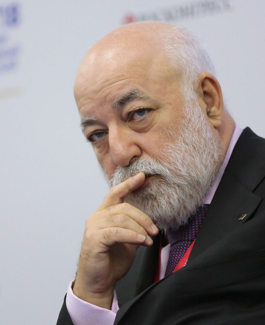By John Helmer, Moscow
![]() @bears_with
@bears_with
In the cartoon, Mighty Mouse was always on the defensive, repelling attacks from wicked aggressors, cats, for example, or dogs. When the cartoon first began in 1942, the words of the theme song were also defensive: “Mr. Trouble never hangs around, When he hears this mighty sound: ‘Here I come to save the day!’ That means that Mighty Mouse Is on the way!” After the defeat of Germany, Mighty Mouse changed his tune: he moved on to the offensive: “Here he comes, that Mighty Mouse, Coming to vanquish the foe With a mighty blow! Don’t be afraid any more ‘Cause thing won’t be like they’ve been before!” The mouse now decides who the enemy is.
In real life, in the sanctions war against Russia, the US Government has decided through the Office of Foreign Assets Control (OFAC) which Russians to attack, In the process, though unreported, the sanctions give millions of dollars’ worth of benefits to the business rivals and competitors of OFAC’s targets. The European Union, and its member governments, claim they will protect their companies from this US Government-backed asset raiding; in practice they don’t.
A new London High Court case reveals how OFAC helped an Anglo-Indian businessman named Pradip Dhamecha default on a two-year old loan and keep more than £34 million of Victor Vekselberg’s money because Vekselberg had been sanctioned by OFAC four months after the loan was signed and Dhamecha’s bank pocketed his cash. The court ruling, issued on September 12, also declares that the British Government’s policy to stop the extra-territorial reach of the US sanctions to British law and jurisdiction is worthless. “I do not consider the alleged policy is material”, declared Mark Pelling, a practicing Queen’s Counsel serving as a High Court judge.
The outcome of the case, Pelling decided, turns on the right of might; that is, Dhamecha’s right not to pay Vekselberg what he owes because the American Government might sanction Dhamecha for doing so. “Payment,” claimed the judge, heaping conditionals and subjunctives upon each other, “has been impliedly [sic] prohibited because of the probability [sic] that the relevant sanction will be imposed if [sic] it pays [Vekselberg company] the sums it is entitled to under the contract.”
The case in this month’s judgement started with a loan for £30 million given by a Vekselberg company called Lamesa Investments Ltd (LIL), registered in the British Virgin Islands, to Cynergy Bank Ltd (CBL). The date was December 19, 2017. The court ruling describes CBL as a “UK registered company carrying on business in England as a retail bank.”
The full 12-page judgement can be read here.
Omitted from the court record is that when the loan was made, the bank’s name was Bank of Cyprus UK.  At that time the entity was a subsidiary of the Bank of Cyprus, and most of its client deposit and loan business was among Cypriots based in the UK since the time Cyprus was a British colony. In December 2017, when Vekselberg (right) loaned the money, he was the largest shareholder of the Bank of Cyprus; he still is.
At that time the entity was a subsidiary of the Bank of Cyprus, and most of its client deposit and loan business was among Cypriots based in the UK since the time Cyprus was a British colony. In December 2017, when Vekselberg (right) loaned the money, he was the largest shareholder of the Bank of Cyprus; he still is.
Vekselberg’s co-shareholder at the Bank of Cyprus was Wilbur Ross; he stepped off the bank board after being appointed US Commerce Secretary in February 2017. It is unclear when or if (Judge Pelling’s word) Ross divested himself, directly or indirectly, of his 18% stake in the bank by the time the loan was made in December 2017; for more details, read this.
Cynergy Bank (called CBL in the Pelling judgement) is in fact the re-named version of the UK affiliate of Bank of Cyprus, which was controlled by Vekselberg and Ross.
The bank’s website does its best to obscure the details. In 2012, the British subsidiary incorporated itself independently of the Cyprus parent, and thus protected its deposit holders and investors from the action by the European Union against the parent bank in March 2013; that was the so-called “haircut” or confiscation of the bank depositors’ money in exchange for a European Union loan to the Cyprus Government. The deception in that deal was explained in part here.
In July 2018 the Cyprus parent sold the UK entity purportedly for £103 million. The buyer was Cynergy Capital. That entity had been created just weeks before the deal, on May 17, 2018.
Cynergy’s invested capital was paltry — less than £7.4 million at the time. So it was far smaller than its takeover target; where the money for the bank buy-out was coming from is unknown. The identity of the controlling shareholders of Cynergy at the time was also obscure, if not murky. What appears to have happened was that the bank in Cyprus took a charge over Cynergy Capital for the deal. In other words, the Bank of Cyprus financed the sale of its subsidiary to outsiders with no banking experience; it did that to improve the appearance of its balance-sheet.
But the loan deal with Vekselberg had already occurred in December 2017. In essence, the UK entity was borrowing money from its own shareholder to buy itself out of the Bank of Cyprus (BOC). The re-naming of the bank to Cynergy occurred in December 2018 – a year after it had borrowed from Vekselberg.
The buyers were reported by the Financial Times as two Anglo-Indian businessmen “Pradip Dhamecha, co-owner of a London cash and carry business; and Balbinder [Singh] Sohal, chairman of property investor SevenCapital. Other directors including John Coulter and Ann Jones.” Coulter and Jones were a brother and sister owning the UK jewellery group Warren James. They have disappeared from the records.
Sohal’s money comes from a highly leveraged real estate development entity which puts together deals in the Birmingham area. Its sources of money are not identified; it is believed they are other Anglo-Indians or Indians from the sub-continent. Sohal lacks the net capital to have bought the bank from BOC. In fact, according to filings at UK Companies House, Sohal was in control at Cynergy on May 16, 2018, and then Dhamecha became the sole controlling shareholder ten days later. He and Sohal are the only listed directors.
Dhamecha owns (with his brother) a combination of grocery supplies, real estate, and other businesses. His net worth is reportedly about £44 million. He too lacks the means to have bought the bank from BOC.

Left to right: Pradip Dhamecha; Balbinder Sohal; Mark Pelling.
Cynergy Capital is a totally non-transparent entity. No financial reports have been filed. A statement of its capital at Companies House claims that last week it amounted to £137.3 million. Cynergy Bank is almost as dark. At the time it borrowed from Vekselberg, the bank – which does not publish financial reports – claimed its loan book was £1.52 billion of gross loans and it was holding £1.66 billion of deposits; that’s according to the Financial Times. The UK bank regulator may have more precise figures.
The amount at stake in the Vekselberg loan was just under 2% of the bank’s book. But five months later, when Dhamecha needed BOC money for the buy-out Vekselberg’s money came to 29% of the takeover figure. His loan terms required the bank to pay annual interest of about 3.3% in two instalments falling due on June 21 and December 21. By December of last year, Dhamecha’s Cynergy (CBL) owed Vekselberg’s Lamesa (LIL) £3.6 million in interest. Default on interest called the £30 million principal for full repayment.
At the same time, Cynergy reported later to the High Court, its US currency holdings amounted to $15 million in a correspondent account maintained in New York by JP Morgan; that amount to 0.7% of the bank’s total deposits. The bank also testified it had “entered into foreign exchange swap contracts with another bank in order to protect against exchange rate risk.” How much in US dollars was exposed is not reported in the court ruling.
The US Treasury and OFAC announced the sanction against Vekselberg on April 6, 2018; for the full story then, read this.
No real reason for proscribing Vekselberg was given. Vekselberg, declared the Treasury, “is being designated for operating in the energy sector of the Russian Federation economy. Vekselberg is the founder and Chairman of the Board of Directors of the Renova Group. The Renova Group is comprised of asset management companies and investment funds that own and manage assets in several sectors of the Russian economy, including energy. In 2016, Russian prosecutors raided Renova’s offices and arrested two associates of Vekselberg, including the company’s chief managing director and another top executive, for bribing officials connected to a power generation project in Russia.”
The Bank of Cyprus announced in Nicosia it would consider what should be done about the sanction for the running of the bank and its board. “The U.S. and Russia are in a kind of economic war and you fight those wars where the two sides meet,” BOC’s chief executive, an Irishman named John Hourican, told Wall Street Journal. “They meet in Cyprus.”
In London, Dhamecha was busy raising the money to buy Bank of Cyprus UK. He didn’t manage to close the deal until November 23, 2018. He then decided he could refuse to pay interest on Vekselberg’s loan, and refuse to repay the loan principal also. He calculated that, courtesy of the US Treasury, it would be lawful for him to keep, if not take, the money from Vekselberg. The High Court papers don’t reveal exactly when he revealed this intention to Vekselberg. That appears to have occurred later that month, or in January 2019.
Lawyers for Cynergy told the court the money had been “ring-fenced…and is available for payment subject to resolution of the issues to which I [Judge Pelling] turn”. The judge claimed this was “unclear” – that’s a High Court euphemism for disbelief. In fact, now that the judge has ruled in Cynergy’s favour, Dhamecha can avoid repaying Vekselberg for as long as the US sanctions war lasts.
The bank testified to the court that tiny though the amount of its exposure in US dollars was, the risk of being punished by OFAC for making any payment to Vekselberg would be “obviously ruinous”. Vekselberg’s lawyers didn’t challenge this claim as exaggerated or false.
Pelling then moved to decide whether the loan contract and British law protected Vekselberg’s right to getting his money back, or Dhamecha’s right to keeping it for himself. Pelling took one day, July 15, for hearing the lawyers argue their cases, with two weeks remaining in the month before the court’s summer recess. When Pelling issued his judgement on September 12, the court hadn’t resumed.
Cynergy told the judge that once Vekselberg had been sanctioned, there was a possibility that the bank might be hit with a secondary sanction for paying money to the loan company, Lamesa. That “might” gave it the legal entitlement to avoid the risk by not paying at all. The effect of the sanction, argued the bank, “is to impose on it an implied obligation not knowingly to facilitate a significant financial transaction on behalf of a person included on the list of SDNs and Blocked Persons maintained by OFAC pursuant to Executive Order 13662. It maintains that since LIL [Vekselberg’s Lamesa] is a Blocked Person (something that is common ground) and that payment of interest under the FA [Facility Agreement, i.e., loan contract] is at least arguably a significant financial transaction and there is no realistic prospect of a presidential waiver it follows that CBL [Cynergy] is at realistic risk of becoming subject to the sanctions set out in section 3(c) UFSA [Ukraine Freedom Support Act, 2014] if it pays LIL the interest to which it is entitled under the FA. It maintains that in those circumstances it is entitled to avoid this risk by not paying the interest otherwise due by operation of clause 9.1 of the FA.”
Vekselberg’s lawyers argued the loan agreement didn’t allow this. “Clause 9.1 [of the loan contract] requires CBL [Cynergy] to be able to demonstrate that there is a legal provision that expressly prohibits it from making the payment relied on. It submits that on proper analysis none of the provisions of US law that CBL relies on have that effect (since it does not come within any of the categories to which primary sanctions would apply) and that on proper analysis all that CBL is doing is not paying in order to avoid the possibility that the section 5(c) UFSA [Ukraine Freedom Support Act, 2014] sanction might be imposed on it. It maintains that the word ‘mandatory’ means that the provision relied on must make it compulsory for CBL to refuse payment and the provisions that it relies on do not have that effect.”
In Pelling’s judgement, during the loan negotiations in late 2017, the bank – Bank of Cyprus UK and Bank of Cyprus – was aware, as was Vekselberg, that the US Treasury might strike at Vekselberg. Pelling ruled “this possibility is therefore a circumstance known or assumed by the parties at the time that the document was executed.” He also decided that to deal with that possibility, Lamesa as lender and Bank of Cyprus UK as borrower should – another conditional –have included explicit language in their deal papers to address the risk. “All parties were or should have been aware of the effect of the US legislation,” Pelling ruled. “The reason why a provision such as clause 9.1 is included in a contract such as the FA is to eliminate the ‘double jeopardy’ risk. It is not of any effect or benefit where a payment has been made to LIL [Vekselberg] and a sanction is imposed following an attempt by CBL [Cynergy] to persuade the US authorities not to impose a sanction.”
Vekselberg argued that it wasn’t up to him to take account of US economic warfare risks, nor lawful for Dhamecha to shield his default under the US sanctions law, because both of them were beyond American reach and equally subject to British law, the law agreed for the loan contract. His lawyers told the judge that as a BVI lender in British currency and the borrower as a UK entity were both covered by UK and European Union law and by British Government policy. “I reject LIL’s [Vekselberg’s] submission,” Pelling ruled dismissively, “that the construction that I have arrived at is contrary to ‘… the UK’s long standing policy of not giving extraterritorial effect to US foreign policy as enacted through its secondary sanctions programmes’.”
Pelling claimed there was no such a policy at all; in effect, he made a new British Government policy of his own. “Unless there is a mandatory rule of English law that precludes parties to a contract from including a provision to the effect alleged I do not consider the alleged policy is material. The secondary sanctions with which I am now concerned create a risk that the parties to a contract such as the FA are entitled to manage by agreement in the absence of such a provision. There is no such mandatory rule. The only such rule that is incorporated into English law is that contained in Council Regulation (EC) No. 2271/96. That applies only to those laws specified in the Appendix. Thus there is no general policy as suggested by LIL. The laws giving rise to the issue in this case are not included within the Appendix to Regulation 2271/96.”
Look carefully at what the judge is ruling. He claims that the only protection from US attempts at extra-territorial sanctions is the European Union regulation of November 22, 1996. At that time, the EU was intent on stopping US sanctions against Cuba from interfering with European, including British, dealings with Cuban individuals or entities. That was eighteen years before the start of the US war against Russia in Ukraine, and before the Obama Administration claimed the power to punish Russian companies and individuals worldwide. Read the 1996 regulation here.
Pelling ignored the entire archive of British and EU case law on the illegality of more recent and current US sanctions against Iran; read that here. Pelling also ignored the ruling of the Supreme Court, the highest of the British courts, in what makes foreign economic sanctions lawful British government policy, or illegal. In the judgement written by Lord Justice Jonathan Sumption in June 2013, US sanctions imposed without reason and disproportionate to purpose, and without allowing the target to defend himself, are unlawful for application in the UK. Read the Supreme Court judgement here. Click for the full story.
Pelling’s record as a judge has been criticized by the Court of Appeal for exercising judgement prematurely and prejudicially, and failing to address the required evidence and defence in a case. Vekselberg’s lawyers and spokesman are not commenting on the Pelling judgement, or their intention to appeal.














Leave a Reply